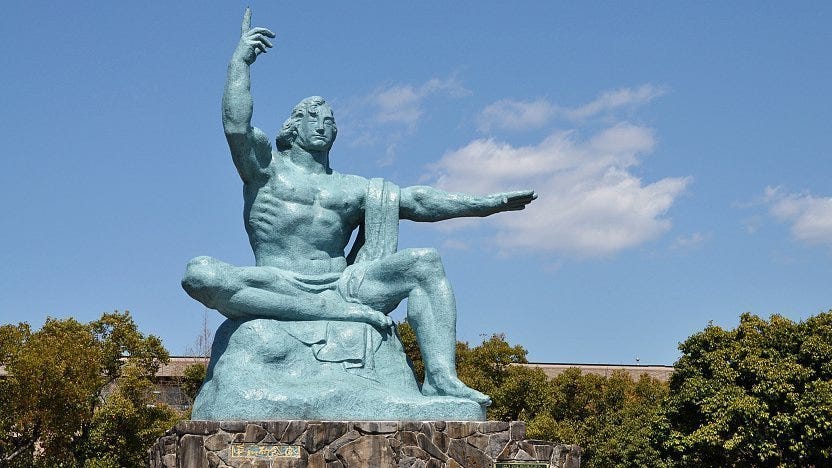USA Boycotts Japan for...Israel?
On the anniversary of Nagasaki, the United States is siding with Israel over Japan—further undermining global peace and nuclear disarmament
On Aug. 6, 1945, the United States dropped a nuclear weapon on Hiroshima, Japan killing some 140,000 innocent civilians. Three days later on this day August 9 in 1945, the United States dropped a second nuclear bomb on the city of Nagasaki, killing another 70,000 innocent civilians. Now, as the city of Nagasaki, Japan held a peace ceremony in memory of those horrific bombings, the United States boycotted. Why? Because the Mayor of Nagasaki disinvited the Israeli ambassador.
Some today still argue that the use of these nuclear weapons was a necessary evil to prevent even more death and destruction. They point to Japan’s surrender less than a week later, which enabled an end to World War II, as proof that the use of nuclear weapons was the right choice. But correlation isn’t causation, and the facts demonstrate that such justifications have no merit in reality. The United States was wrong to use nuclear weapons then, just as it is wrong to boycott Japan’s peace ceremony now.
Let’s Address This.
The facts are clear. The United States deployed nuclear weapons on Japanese civilians knowing full well they were not necessary to end the war. Consider the testimony of none other than Dwight Eisenhower, supreme allied commander, five-star general, and of course eventual president of the United States, who said:
I was against it on two counts. First, the Japanese were ready to surrender, and it wasn’t necessary to hit them with that awful thing. Second, I hated to see our country be the first to use such a weapon.
Even known racist Admiral William “Bull” Halsey, notorious during the war for his bigoted motto to “Kill Japs, kill Japs and kill more Japs!” later lamented,
The first atomic bomb was an unnecessary experiment. It was a mistake to ever drop it. [The scientists] had this toy and they wanted to try it out, so they dropped it. It killed a lot of Japs, but the Japs had put out a lot of peace feelers through Russia long before.
Likewise, as World War II historian Ian W. Toll points out, U.S. military leadership was categorically opposed to dropping nuclear weapons on Hiroshima and Nagasaki, both because it was an unnecessary strategy to end the war, and also because it was morally indefensible. Toll writes,
In 1945, eight Americans (four generals, four admirals) held five-star rank. Seven later stated that the bombings were either unnecessary to end the war, morally indefensible, or both. That fact is all the more arresting when you consider that their professional code discouraged second-guessing the decisions of superiors, and that they were discussing an event that had already happened, and thus could not be reversed.
Moreover, the U.S. war cabinet’s instructions to drop nuclear weapons made no mention of sparing women and children—something that today would be considered a war crime. Indeed, Japan remains the only nation on Earth that has ever suffered the onslaught of nuclear weapons. Perhaps in stark memory of these atrocities, Nagasaki Mayor Shiro Suzuki declined to invite the Israeli ambassador to the Nagasaki peace ceremony.
In response, the United States, and five other nations opted to withdraw their ambassadors to stand in solidarity with Israel. In other words, the the United States refused to attend the Nagasaki peace ceremony held in memory of innocent civilians murdered with American nuclear weapons to instead stand in solidarity with a nation murdering innocent civilians with American conventional weapons. In a word, absurd.
I admire Mayor Suzuki’s moral clarity. Israel faces credible accusations of war crimes from the ICJ and ICC, extermination from the United Nations, and genocide from a plethora of world renowned human rights organizations. While America’s nuclear bombs killed some 210,000 Japanese civilians, The Lancet estimates conservatively that Israel’s bombings have killed at least 186,000 Palestinian civilians as of June, 2024. And just as America’s bombings made no mention of sparing women and children, Israel’s bombings have likewise killed tens of thousands of innocent women and children.
And despite Israel’s public refusal to admit it has nuclear weapons in its arsenal, it is well documented that the State has in its possession at least 300 nuclear missiles. As the non-profit organization the Nuclear Threat Initiative (“NTI”) reports:
Although Israel has possessed nuclear weapons since the 1960s, it maintains a policy of nuclear opacity, never officially confirming the existence of its nuclear program. Accordingly, Israel has never signed the NPT. Israel manufactures and deploys a diverse range of technologically sophisticated ballistic missile, cruise missile, and missile defense systems.
Why should Japan invite a nation to attend a peace ceremony dedicated to abolishing nuclear weapons, when that nation is not only credibly committing war crimes on a daily basis, but refuses to abide by international law in nuclear weapons management? Mayor Suzuki lamented at the Nagasaki peace ceremony that:
You must face up to the reality that the very existence of nuclear weapons poses an increasing threat to humankind, and you must make a brave shift toward the abolition of nuclear weapons. The world faces a critical situation because of Russia’s invasion of Ukraine and accelerating conflicts in the Middle East.
Nuclear weapons are an existential threat to humanity. No nation is truly safe as long as these weapons proliferate. The United States must lead from the front and negotiate meaningful nuclear de-proliferation on a global scale. This is not an impossible task by any means, as evidenced by the success of The Strategic Arms Reduction Treaty (START I), signed in 1991. START united the United States and the Soviet Union to nuclear arms reduction, and by 2001, its full implementation resulted in an 80% reduction of the world’s strategic nuclear weapons.
Rather than boycott peace ceremonies committed to nuclear disarmament, the United States must revive peace talks to lead by example. The use of nuclear weapons on Hiroshima and Nagasaki was indefensible then, and refusing to act to prevent such further atrocities is indefensible today. Thus, given the United States was the first and remains the only nation on Earth to ever deploy nuclear weapons against a civilian population, it has a moral imperative to ensure it also remains the last nation to deploy nuclear weapons for any reason, period.
Why Your Support Matters: Every dollar we spend is a vote for the kind of future we want. Help me create a future more committed to justice and universal human rights. Subscribe, and I welcome your thoughts, feedback, and insights. Thank you.




I feel embarrassed. Is the USA a moral/ethical desert? Hello! We are the ones who dropped the bombs. We were trying to get the technology first, before the Germans in WWII. Many of the scientists were refugees from Europe who knew exactly what the danger was. But the scientists also were thinking of it as a deterrent - which since WWII it has been, thank goodness. The Mayor’s point in not inviting Israel is to promote peace over war, and he is on firm moral ground. If other countries boycott, it’s too bad. But for us to boycott is indefensible. We don’t need to further make clear we support Israel; is anyone in doubt? But here was an opportunity to stand for peace, for international rules of engagement, for ethical behavior……..and we squandered it. For what? The Mayor and Japan are trying to honor the victims and point the way to a better, nuclear bomb free, violence free peace loving future. How on earth can we defend this decision? Who made this decision? I have questions!
Qasim, thank you for this; I wouldn't have known and am deeply disappointed. There was nothing positive to be gained by this boycott and everything to lose. And it flies in the fact of the idea that the US supports Israel's security but does not support the Gaza war... Sure hope that Kamala agrees with this distinction and makes this public as soon she can.. It has also not been so public that our military was against dropping the bombs on Hiroshima and Nagasaki... it was suggested to drop on Tokyo
Bay which would have made the point and killed less people. Whatever was Truman thinking:...???